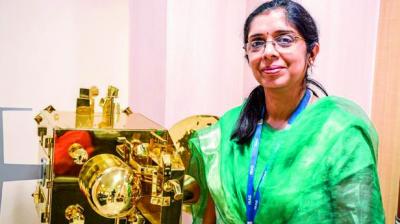Women really are making their mark around the world — and even out of it. We were so excited to see “India’s rocket women” celebrating the country putting a satellite in orbit around Mars. Not only were the women involved with and leading the Mars orbiter mission, the Indian Space Research Organization has several women scientists in key positions helping the country explore space. The Deccan Chronicle got to know a few of these remarkable women.
deccanchronicle.com – The overwhelming success of India’s space missions has highlighted the role of the country’s women scientists.
Think Indian Space Research Organisation (ISRO), think Vikram Sarabhai, Satish Dhawan, G. Madhavan Nair, Rodham Narsimha and a host of geniuses. They build on an earlier generation of scientists who worked to push India’s space frontiers, men who came to define the contours of the country’s scientific rediscovery — C.V. Raman and Meghnad Saha. But times are changing.
Two years ago, as Indian scientists successfully put a satellite Mangalyaan into orbit around Mars, history was scripted. Away from the dour image of spectacled and formally suited nerds working on complex diagrams and theories, this snapshot of Indian scientists, who achieved the feat in a record 15 months, was warmly refreshing — women dressed in resplendent saris, chatting gaily as they went about their work.
Given that they have to work hard at home as well, faced as they are with societal discrimination, the Isro story remains a landmark not just for Indian science, but the women behind it.
Ritu Karidhal — from sky watcher to scientist
Ritu Karidhal is the Lucknow-born deputy operations director of the Mars Orbiter Mission. As a little girl growing up in Lucknow, Ritu was an avid sky watcher who “used to wonder about the size of the moon, why it increases and decreases. I wanted to know what lay behind the dark spaces,” she says.
A student of science, she scoured newspapers for information about NASA and ISRO projects, collected news clippings and read every detail about anything related to space science. After getting her PG degree, “I applied for a job at ISRO and that’s how I became a space scientist,” she says.
Eighteen years later, she has worked on several projects at ISRO, including the prestigious Mars mission, which thrust her and her colleagues into the limelight. She told a news portal in 2015 that she had to conceptualise and ensure the execution of the craft’s autonomous brain so that it could function on its own and even overcome malfunctions.
Manoj Joshi and B. R. Srikanth, Deccan Chronicle
Want to receive early-bird invitations to our global events, custom-tailored content we think you’ll love, and get exclusive access to “The World Women Report”?







